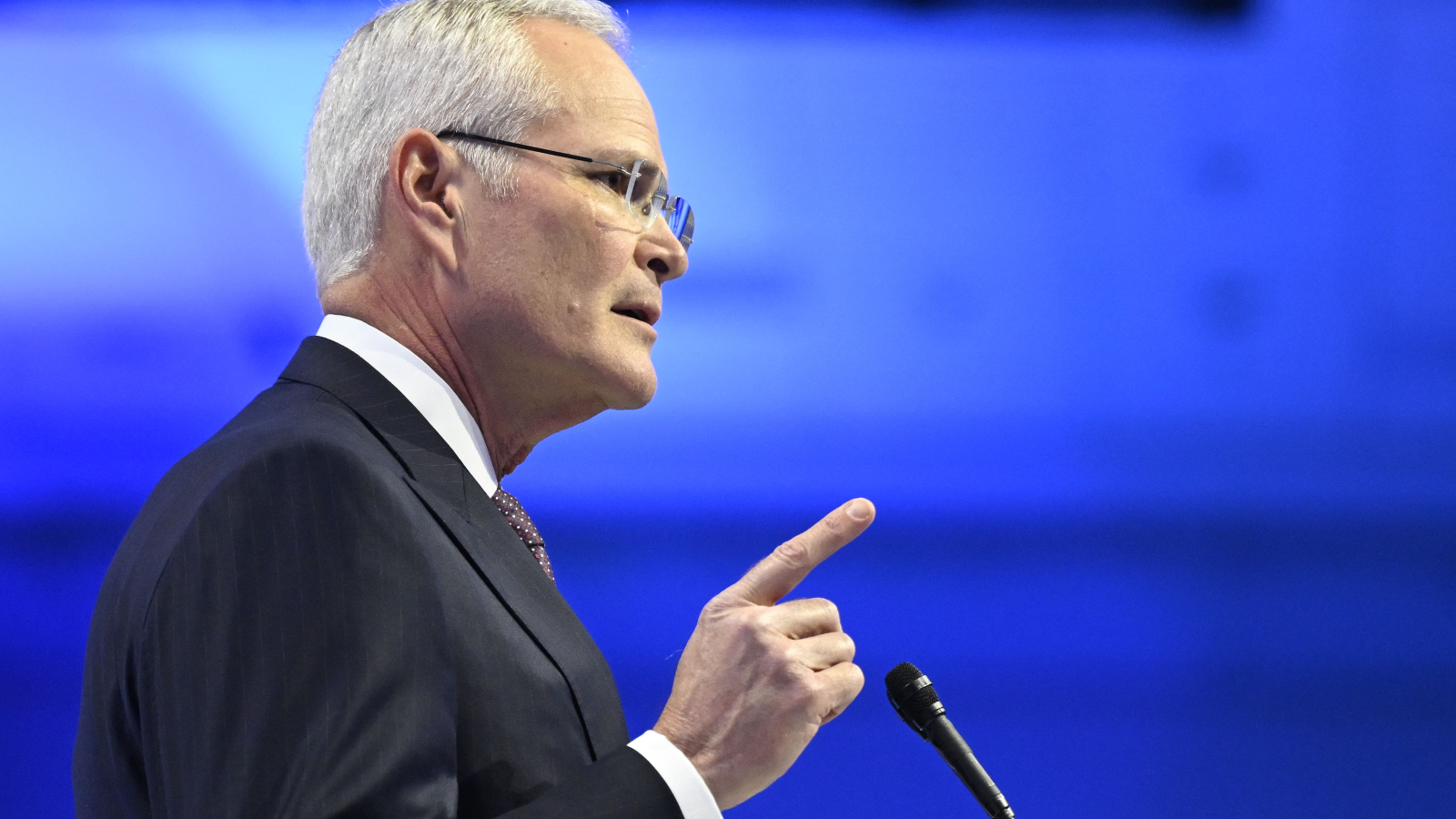When you fill up your tank and drive away from a gas station, is the resulting carbon pollution your fault? Or the fault of the oil giant that supplied the fuel?
Darren Woods, the CEO of Exxon Mobil, the largest publicly traded oil company in the world, has a clear answer. In a rare interview with the media last week, Woods explained that the “dirty secret” behind why the world wasn’t on track to zero out carbon emissions was that it was simply too expensive. In doing so, he subtly pinned the blame for the emissions created by burning oil and gas on his company’s customers.
“The people who are generating the emissions need to be aware of and pay the price for generating those emissions,” he told Fortune’s Leadership Next podcast. “That’s ultimately how you solve the problem.”
The emissions in question, created when oil and gas are actually burned, represent 80 to 95 percent of the worldwide emissions associated with oil companies. In energy wonk-land, these emissions are known as “Scope 3.” Three years ago, under pressure from activist investor groups, Exxon reluctantly revealed the vast scale of its own “Scope 3” emissions for the first time. The company estimated that the products it sold in 2019 resulted in 730 million metric tons of carbon dioxide. For reference, that’s 11 percent of what the entire United States emitted that year.
Big emissions have big consequences. Research from the Union of Concerned Scientists has traced the direct and indirect emissions from fossil fuel producers to ocean acidification, the rise in global temperatures, and wildfires in the Western United States.
Activist investor groups have been calling on oil companies to reduce Scope 3 emissions, but Exxon would rather focus on the direct emissions that come from oil rigs and power plants (Scope 1) and the fuel or electricity purchased for things like operating machinery or powering its offices (Scope 2). Exxon sued two of those investor groups in January over the resolutions they’ve submitted demanding faster emissions cuts, arguing that the repeated submissions amount to abuse of the shareholder proposal system. It’s an aggressive move that some experts see as a sign that Exxon is committed to shutting down conversations about responsibility for the full scope of its emissions.
This issue is a hot topic in oil company boardrooms, according to Laura Peterson, a corporate analyst at the Union of Concerned Scientists. “It’s clear that they find it a threat,” Peterson said. “I think that they know, because their emissions are very high, that they’re not going to be able to just evade them through carbon capture as their climate transition plans claim, and that it’s going to open them up to litigation. And so they are just trying to squelch it.”
Oil companies have been trying to shunt responsibility for carbon emissions for a long time. A study in 2021 scrutinizing Exxon’s memos, studies, and advertisements over the past half-century found that the oil giant used rhetoric to shift the blame for climate change onto average people, their customers. In public communications, the company focused on “consumers” and “demand,” implicitly pointing the finger elsewhere. BP employed a similar strategy, popularizing the idea of calculating your personal “carbon footprint” in marketing campaigns in the early 2000s.
Exxon is one of the few major oil companies that has so far neglected to set any targets for cutting its Scope 3 emissions. The company’s board has argued that applying these targets to companies would cause “significant, unintended consequences for society.” Woods has written that the current way Scope 3 emissions are calculated would encourage bad behavior from companies and force consumers to turn to dirty energy sources like coal. “That’s like saying that requiring calorie information on restaurant menus would force people to binge on junk food,” Peterson quipped in a blog post.
As countries move to regulate Scope 3 emissions, companies are lobbying to stop them. In late February, Reuters reported that the U.S. Securities and Exchange Commission was planning to drop a requirement forcing companies to disclose these emissions from its proposed climate risk rules for corporations. That would place the responsibility for those emissions on customers. But California is heading in a different direction, adopting a law last year that will eventually require large companies that do business in the state to disclose their Scope 3 emissions — including corporate giants like Exxon.
Of course, it’s hard to untangle exactly who bears how much of the blame for the emissions that led to the climate crisis: Big Oil? Governments? Rich countries? Billionaires? Normal people? It’s some combination of all of the above. Oil companies make the case that it’s a “demand” problem — as long as people are driving cars, and thus demanding fossil fuels, then they have to keep producing the gas.
A 2022 report by the Intergovernmental Panel on Climate Change, however, concluded that people demand “services,” not fossil fuels specifically. In fact, the panel found that people could live comfortably with a lot less fossil fuels. “Demand-side” solutions, including shifts in how buildings are constructed, how people get around, and what they eat, have the potential to reduce emissions 40 to 70 percent across all sectors by 2050.
Climate advocates argue that oil companies, with their history of spreading climate disinformation and trying to block policies to move away from fossil fuels, bear a large portion of the blame for climate change. Across the country, around 30 lawsuits filed by cities, states, and Indigenous tribes seek to hold Exxon and other fossil fuel companies accountable for deceiving the public about the harms of using their products.
“They’re responsible for a lot of climate damage, and they’re responsible for misleading the public in the past, which led to more damage,” Peterson said. “And now they’re basically saying that they should not be responsible for disclosing these emissions, because they’re just not relevant to their business.”
Unsurprisingly, Exxon’s CEO wants to move past the whole history aspect. “That was 30 years ago,” Woods told Fortune last week. “I mean, today, the world has moved on. The understanding of this challenge has moved on. I think where we are today is, how can we contribute to a solution set, not debate the past?”




